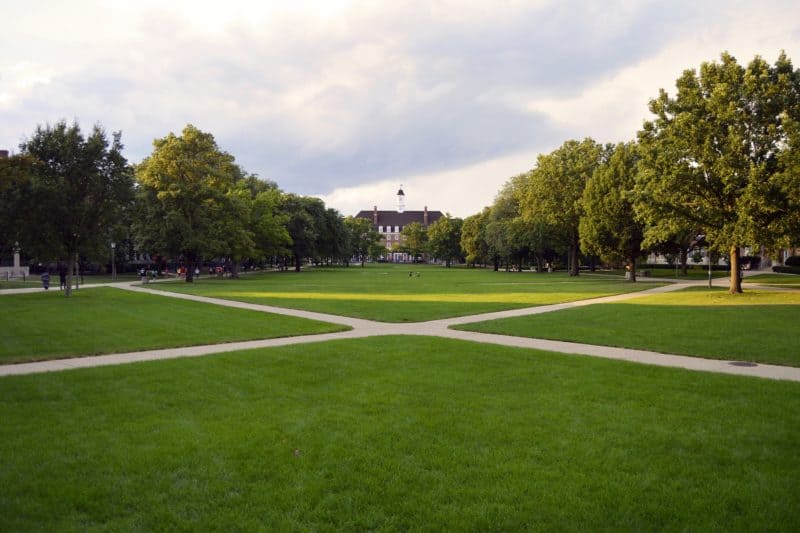The question of whether faculty members suppress students’ right to free speech has been building since the election, but has become more acute in the wake of Charlottesville. In her recent New York Times op-ed, “The ‘Free Speech’ Hypocrisy of Right-Wing Media,” Keeanga-Yamahtta Taylor, a tenure-track faculty member at Princeton University, highlights the hypocrisy inherent in right-wing critiques of “leftist oppression of free speech” on campus. However, what Taylor’s article only briefly addresses is the way that controversies surrounding free speech and safe spaces drastically exacerbate academia’s current labor problems.
While many believe that most professors have the protection of tenure, according to the American Association of University Professors (AAUP), 70 percent of all instructional positions (including both full and part-time) are filled with contingent—or non-tenure-track—faculty. The original purpose of adjunct positions was to provide part-time teaching opportunities for professionals. While this is still the case for some adjuncts, as the number of full-time and tenure-track positions shrinks, more adjunct faculty members teach full-time by piecing together a living (usually without benefits) from multiple part-time jobs.
This is true for us: in our careers as contingent faculty members teaching writing courses, we have held adjunct positions at a range of institutions, including a community college, an Ivy League university, a rabbinical school, a labor college, a fashion institute, and a large research university. We have each cobbled together a living by working at multiple campuses, and the loss of even one of these positions would mean an inability to make ends meet—a likelihood, given that adjuncts are often offered teaching jobs only on a semester-by-semester basis, with no guarantee of continuous employment. Today, being an adjunct is no longer a stop-gap or part-time opportunity for working professionals interested in sharing their expertise. Instead, it has become the status quo. The AAUP reports that more than 50 percent of professors now serve in part-time positions.
While more and more educators feel a moral obligation to explicitly address current patterns in American politics, the reality is that contingent faculty are often afraid of facilitating these conversations because of the risk that complaints from students who might disagree with their assessments will cost them their jobs. There’s increasing discussion of protecting safe spaces for students, but no one is talking about creating safe spaces for contingent faculty to foster and facilitate challenging conversations.
With the economic stakes so high, our concerns about job security naturally impact the choices we make in the classroom. As the AAUP describes, “The free exchange of ideas may be hampered by the fear of dismissal for unpopular utterances, so students may be deprived of the debate essential to citizenship.” The classroom is an ideal site for these debates; a space where students develop habits of critical inquiry by engaging in conversation with a diverse cohort of peers. As educators, it is our job to create a space for these conversations to be productive, but with job security for higher education faculty at an all-time low, doing so is increasingly fraught.
The case of Lisa Durden, the one adjunct faculty member referenced in Taylor’s article, illustrates that contingent faculty can be fired almost immediately in response to their speech, whether it is uttered in the classroom or not. While Durden was generally known to be liked by students, she was fired after appearing on Fox News’s “Tucker Carlson Tonight” and defending the right of antiracist organizations like Black Lives Matter to hold organizing events open only to African-American participants.
Essex County Community College President Anthony Munroe claimed that, in the wake of Durden’s television appearance, the college “was immediately inundated” with responses from students and their parents concerned that Durden’s political views “would negatively impact their experience on the campus.” His comments speak to the growing view of a college education as a consumer product, and students as customers who must be satisfied instead of challenged to think critically.
For faculty to engage in the challenging dialogues that tenure was originally intended to protect, job security is imperative. Reaffirming faculty members’ right to free speech simply is not enough. To truly ensure that faculty have the free speech protections required to do their jobs well, substantive changes must be made to the way universities hire, manage, and retain their faculty workforce. In the long term, this means reducing the reliance on contingent faculty and hiring for the tenure track. In the short term, university administrations must take steps to ensure the continuous employment of their contingent faculty members.
Developments like The City University of New York’s recent commitment to offer multi-year contracts to long-term adjuncts are a good start. However, even this plan is not comprehensive enough, as an adjunct must have worked for five consecutive years at the same CUNY college to be eligible. This means that an adjunct professor employed by CUNY still has to endure five years of employment uncertainty before “earning” a mere three-year commitment from their employer. Ideally, such a deal would offer multi-semester contracts to all contingent faculty, in order to foster the kind of job security that enables free, open dialogues on campus.
At the very least, universities must not block adjunct faculty and graduate student instructors from unionizing, as representation by a union not only increases the likelihood that contingent faculty will achieve the working conditions necessary for success, but also institutes systems for recourse in cases where contingent faculty are fired for their speech.
Ultimately, when universities rely heavily on contingent labor, they do more than reduce their own bottom lines; they limit their faculty’s ability to both challenge and protect students’ beliefs and ideals. In order to maintain a balance of free speech and safe spaces for our students, we must create safe spaces for contingent faculty members to do their jobs.

